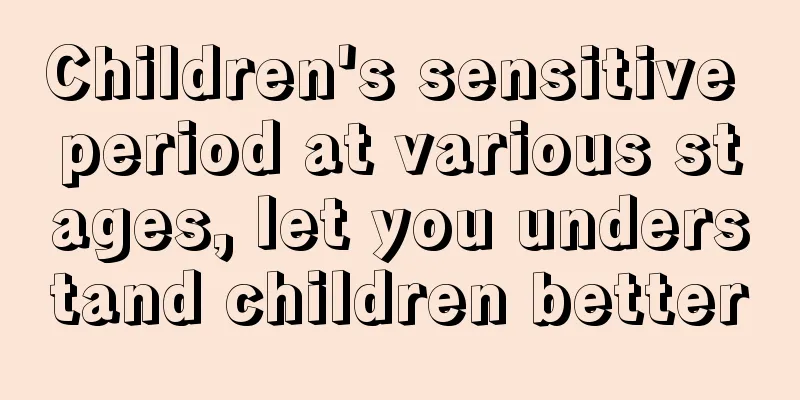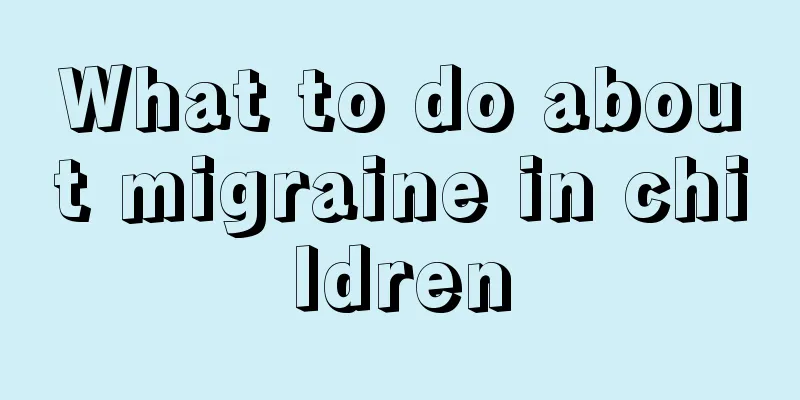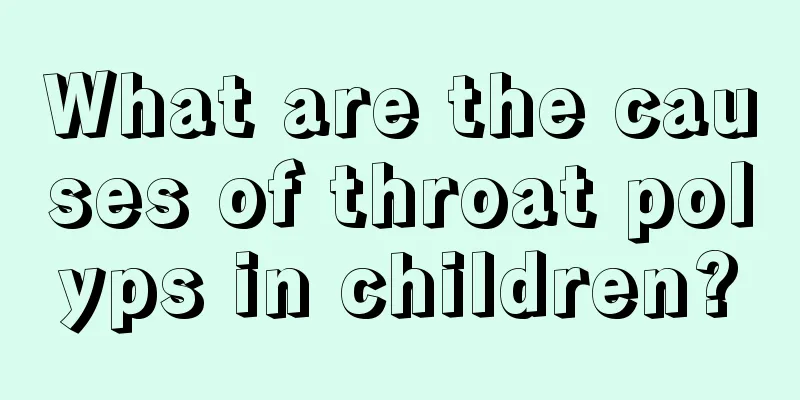Children's sensitive period at various stages, let you understand children better

|
Children will show sensitivity at different stages. Language sensitivity, sensory sensitivity, and movement sensitivity will all appear at a specific age. Parents must pay more attention to their children. Parents must be able to give their children correct guidance in time when children show sensitive symptoms at different stages. 1. Language sensitive period (0-6 years old) When a baby begins to look at the shape of an adult's mouth when they speak and makes babbling sounds, his language sensitivity period begins. Language ability affects children's ability to express themselves. Therefore, parents should talk to their children frequently, tell them stories, or use "rhetorical questions" to strengthen their children's ability to express themselves and lay a good foundation for their future interpersonal relationships. 2. Writing sensitive period (3.5-4.5 years old), reading sensitive period (4.5-5.5 years old) Although children's writing and reading abilities develop later, if they receive sufficient learning during the sensitive period of language, senses, and body movements, their writing and reading abilities will develop naturally. At this time, parents can choose more reading materials and create a home environment full of books, so that children can develop a good habit of loving reading. 3. Order Sensitive Period (0-3 years old) Children need an orderly environment to help them understand things and become familiar with the environment. Once the familiar environment disappears, he will be at a loss. Young children's sensitivity to order is often manifested in their requirements for sequence, living habits, and possessions. If adults fail to provide an orderly environment, children will "lack a foundation for establishing a perception of various relationships." As children gradually establish an internal order from the environment, their intelligence is also gradually constructed. 4. Sensory sensitivity period (0-6 years old) From birth, children use senses such as hearing, vision, taste, and touch to familiarize themselves with the environment and understand things. Before the age of 3, children absorb things around them through their subconscious "absorbent mind"; between the ages of 3 and 6, they are more able to analyze and judge things in the environment through their senses. Guide children to use their five senses randomly in life to feel the things around them. Especially when children are full of desire to explore, their needs should be met as much as possible as long as they are not dangerous or do not infringe on others or other property. 5. Sensitive period of interest in subtle things (1.5 to 4 years old) Busy adults often ignore the small things in their surroundings, but children can often capture the mysteries. Therefore, if a child becomes interested in small insects in the soil or tiny patterns on clothes, it is a good time to cultivate the child's attentiveness and seriousness. 6. Motor sensitivity period (large muscles 1 to 2 years old, small muscles 1.5 to 3 years old) A two-year-old child can already walk, and is at his most active and lively stage. Parents should allow their children to exercise sufficiently so that their body movements become correct and skillful, and help the left and right brain develop in a balanced manner. In addition to large muscle training, small muscle exercises are also carried out at the same time, that is, the training of fine movements of hand-eye coordination. It can not only develop good living habits, but also help the development of intelligence. 7. Social norms sensitive period (2.5 to 6 years old) Two and a half year old children gradually become less self-centered and more interested in making friends and participating in group activities. At this time, parents should establish clear living norms and daily etiquette with their children so that they can abide by social norms and have a self-disciplined life in the future. 8. Culturally sensitive period (6 to 9 years old) Young children's interest in cultural learning begins at the age of 3, and when they are 6 to 9 years old, they develop a strong desire to explore the mysteries of things. Therefore, during this period, "the child's mind is like a fertile piece of land, ready to receive a large amount of cultural seeds." Adults can provide rich cultural information at this time, based on local culture and extending it to a broad mind that cares for the world. |
<<: Symptoms of baby laryngitis, common acute laryngitis in children
Recommend
What should I do if my two-month-old baby's jaundice has not subsided?
Nowadays, many newborns have symptoms of jaundice...
Education of a 3-year-old
The education of 3-year-old children is a topic t...
Both temperature and nutrition are important in premature infant care
The care of premature babies is a particularly im...
Junior high school summer vacation schedule
Developing good work and rest habits is of great ...
The best way to brush your toddler's teeth
We all know that the way and method of brushing t...
Your baby's back muscle tension is high, know the symptoms first
Parents of their babies are extremely concerned a...
How tall is a one year and eight month old baby?
The baby's health is the most concerned issue...
What to do if your three and a half year old baby is constipated
In life, many babies are prone to constipation, e...
Nine-month-old baby's low intelligence
Although babies' development times are differ...
It is harmful for children not to attend preschool
So when people have a baby, they will be troubled...
How to correct baby's stuttering?
When a baby stutters, parents will be nervous and...
Two-year-old baby's poop smells really bad
Feces are excess waste in the human body, so when...
What are the rules for inheritance of children’s IQ?
Genetics is amazing. We should be grateful to our...
The baby keeps moving his hands and feet
The baby's physical health is very important,...
Is it okay for children to take a bath every day?
Taking a bath is a common thing in life. As for t...









